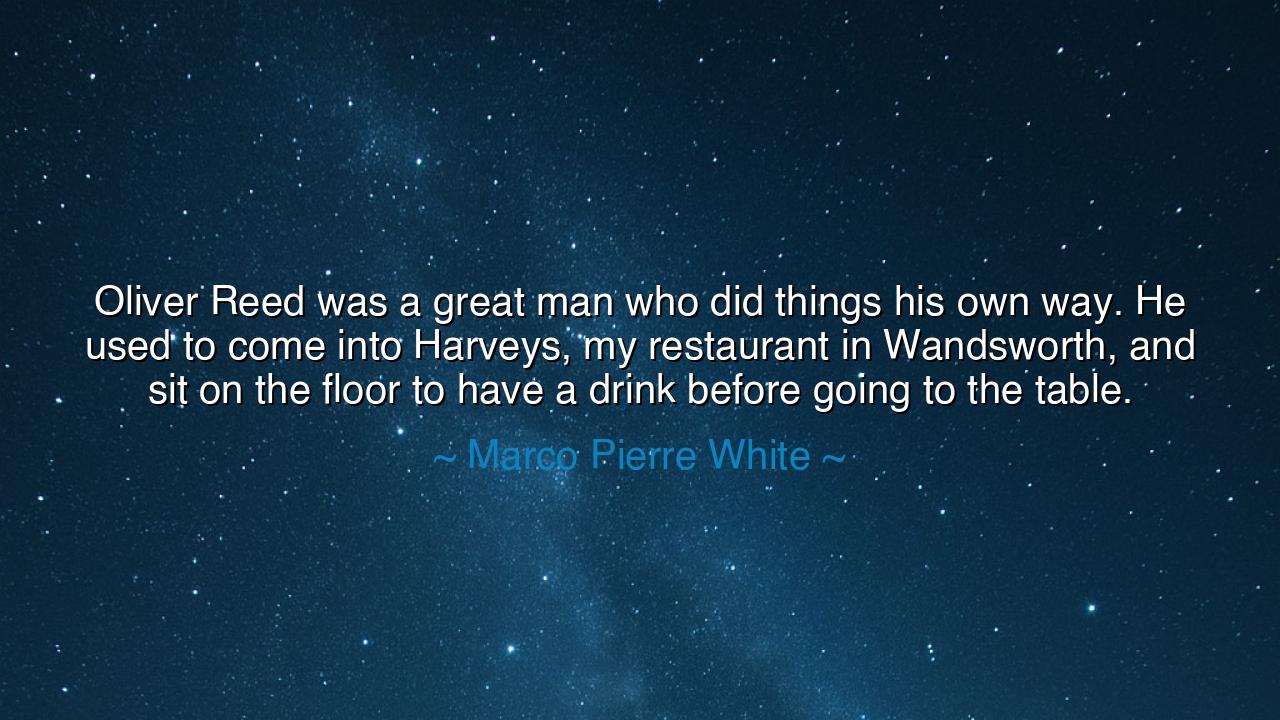
Oliver Reed was a great man who did things his own way. He used
Oliver Reed was a great man who did things his own way. He used to come into Harveys, my restaurant in Wandsworth, and sit on the floor to have a drink before going to the table.






“Oliver Reed was a great man who did things his own way. He used to come into Harveys, my restaurant in Wandsworth, and sit on the floor to have a drink before going to the table.” Thus spoke Marco Pierre White, the fiery master of the kitchen, the chef whose art was as raw and unyielding as his spirit. Yet in this recollection of the wild actor Oliver Reed, he gives us not a tale of eccentricity alone, but a portrait of authenticity — a man who lived as he pleased, unchained by convention, unashamed of his truth. It is a simple memory, yet it carries the fragrance of a vanished age — when men dared to be ungoverned, and greatness was measured not by compliance, but by courage of character.
For what does it mean to “do things one’s own way”? It means to live without the armor of imitation, to walk the road that others call strange, to follow one’s inner compass even when the crowd points elsewhere. Oliver Reed, the tempest of British cinema, was a man of contradictions — fierce and gentle, reckless and loyal, loud as thunder yet quiet in his conviction. He lived as if the world were a stage too small for him, and every day a performance of life itself. When he entered Harveys and sat upon the floor, it was not rebellion for its own sake — it was ritual, an expression of his nature, an unspoken declaration: “I will not bend to the ordinary.”
Marco Pierre White, who himself rose from the rough streets of Leeds to become the youngest chef to earn three Michelin stars, understood this spirit well. In Reed, he saw a reflection of his own defiance — two men who refused to bow before the polite rules of society. Both were artists of excess, driven by passion rather than decorum, truth rather than reputation. In that act of sitting on the floor, Reed stripped away pretense, reminding all who watched that greatness does not hide behind etiquette. He was not being disrespectful; he was being real, and in being real, he was free.
The ancients too honored such men — those who chose authenticity over applause. Consider Diogenes of Sinope, the Greek philosopher who lived in a barrel and mocked the vanity of kings. When Alexander the Great came to meet him and asked, “Is there anything I can do for you?” Diogenes replied, “Yes — stand out of my sunlight.” He, like Reed, embodied the same truth: that the soul’s dignity does not depend upon power or approval, but upon one’s fidelity to oneself. The world may laugh at such men, but it is their laughter, not their conformity, that echoes through the ages.
There is a certain beauty in defiance when it is born of authenticity. The world often demands that we conform — that we sit where we are told, speak as we are taught, and dream only within the borders drawn by others. Yet those who dare to live their own way become the torchbearers of individuality. They remind us that true greatness is not about following the path, but about creating one. Reed did not care whether his habits pleased or puzzled those around him; he cared only to remain faithful to his nature. And in that faith, he became immortal — not as a saint or scholar, but as a man who lived vividly, unapologetically, and without disguise.
But let none mistake this freedom for arrogance. To live one’s own way does not mean to scorn others, but to stand firm in one’s essence while honoring the spirit of others. Self-possession is not selfishness; it is integrity. It is the ability to sit upon the floor of a fine restaurant and still be a king in one’s own right. Reed’s gesture was not rebellion against manners — it was rebellion against falseness. And that is a rebellion worth waging in every age.
So, my children, learn from this tale of the actor and the chef. Be not afraid to be yourselves, even when the world misunderstands you. Let your choices reflect your truth, not your fear. Walk into the grand halls of life and, if your spirit so wills, sit upon the floor — for dignity is not granted by the seat you take, but by the honesty with which you live. Be bold enough to do things your own way, but wise enough to do them with heart.
For in the end, as Oliver Reed and Marco Pierre White both knew, life is too brief for pretense. The wine is sweeter when drunk with sincerity, and the meal richer when shared in truth. To live your own way is not to escape the world, but to inhabit it fully — fiercely, joyfully, and without apology. And when your story is told, may it be said of you, as Marco said of Oliver: “They did things their own way — and in doing so, they lived greatly.”






AAdministratorAdministrator
Welcome, honored guests. Please leave a comment, we will respond soon